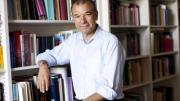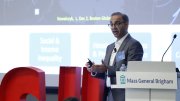A "provocative book arguing that an obscure work of philosophy…changed the course of history" and poems "taking readers into the universe" earned 2012 Pulitzer Prizes for Cogan University Professor Stephen Greenblatt and Tracy K. Smith ’94 today.
Greenblatt won in the general nonfiction category for The Swerve: How the World Became Modern (Norton), his study of the impact of an ancient, largely forgotten Latin work, the De rerum naturae of Lucretius, on fifteenth-century European humanism, and beyond, once it was rediscovered and disseminated by Poggio Bracciolini, an unemployed papal secretary. Greenblatt’s volume, already the winner of a 2011 National Book Award, suggests ways in which the philosophy of Lucretius changed history “by anticipating the science and sensibilities of today," in the words of the Pulitzer citation. As the author told Harvard Magazine last year, he was “amazed,” when he read the poem initially, “at its apparent prescience. ‘So much that is in Einstein or Freud or Darwin or Marx was there…I was flabbergasted.’”
Smith won the prize for “a distinguished volume of original verse” for Life on Mars (Graywolf Press), which the Pulitzer board cited as “a collection of bold, skillful poems, taking readers in the universe and moving them to an authentic mix of joy and pain.” The one-time concentrator in English and American literature and language and Afro-American studies is the author of two previous collections, Duende and The Body’s Question. She is a member of the creative writing faculty at Princeton and a protégé in the Rolex Mentor and Protégé Arts Initiative.
Two former Nieman Fellows also won Pulitzers. Ken Armstrong, NF ’01, of The Seattle Times, shared the prize for a distinguished example of investigative reporting with his colleague Michael J. Berens, for “their investigation of how a little known governmental body in Washington State moved vulnerable patients from safer pain-control medication to methadone, a cheaper but more dangerous drug, coverage that prompted statewide health warnings.” And Mary Schmich, NF ’96, of The Chicago Tribune, received the prize for distinguished commentary “for her wide range of down-to-earth columns that reflect the character and capture the culture of her famed city.” One of the finalists for that award was Nicholas Kristof ’82, of The New York Times, “for his valorous columns that transport readers into dangerous international scenes, from Egypt to Kenya to Cambodia, often focusing on the disenfranchised and always providing insight.” Kristof is a member of the University's Board of Overseers.










